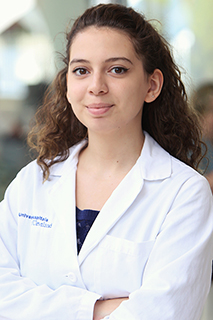
High School: I am a rising sophomore at Berea Midpark High School
Description of project worked on: I studied the effects of CREB on cisplatin resistance in high-grade serous ovarian cancer.
Mentor and years in program: I participated in the program during the summer of 2016 and worked alongside my mentor Peronne Joseph.
Skills obtained: Leadership, confidence, and resilience.
Future professional aspirations: I would like to become a cardiologist.
What influenced your interest in research?
I was interested in what the experience in the lab was like, and I thought the idea of tending to my own experiments sounded interesting and fulfilling.
How did you hear about the program?
I heard about the program through my biomedical teacher, Mrs. Chevon Matthews.
How did you know you were ready to take the next step and work in the lab?
I knew I was ready to work in a lab because during the year in my biomedical class we ran experiments. I was comfortable with mostly all of them.
What do you think is the biggest misconception about programs like this?
The biggest misconception students have is that they think if they make a mistake in the lab, it would be the end of the world. In research you are going to make mistakes, but these mistakes do not hurt you, they actually help you. They fuel more questions and you will likely learn more by making the mistake, than if you did not.
How did you overcome some of the insecurities you faced early on in your training?
I talked about my insecurities with the procedures avidly with my mentor, and she was eager to help me understand. By the end of the program I did not even have to look at my protocol, I knew it so well.
What is the mentorship relationship like?
The mentorship relationship is much like an older sibling relationship. The older sisters or brothers are always more experienced, so you ask them about those experiences and hardships. I always asked my mentor questions and she thoroughly answered them, much like an older sibling should.
How would you describe your mentor?
Peronne was caring, but also scrupulous. Between those two adjectives, I learned the most that I could have during my training in the lab.
Can you describe the atmosphere in the lab?
My lab had a relaxed atmosphere, and quiet most of the time. At the same time, the atmosphere felt polished and businesslike.
What was the most challenging thing for you on the first day in the lab?
The most difficult thing for me on the first day in the lab was learning the background on ovarian cancer. I had not taken biology yet, so I was very new to the entire learning process.
What was the most relieving thing during the training?
The most relieving thing was when I finally understood all of the information that had to do with the protocol and the proteins.
How was this experience memorable to you?
It was my first year doing an internship altogether and I met many great people that I would never be able to forget.
What is the most beneficial thing you believe you learned during your training? Why?
The most beneficial thing that I learned during the training process definitely would have to the realization that I could not do everything on my own. As a good student, I expected to go into the lab and, with some effort, still be able to coast through the program without much help. However, this was not the case. This kind of experience really helps you understand what a team effort really means. Dependability is a valuable trait to have because you know you can work well with others without causing any complications.
For those, considering starting the program, what would you advise?
To really listen to your mentor and pay attention, so that you are not completely lost when you do a procedure yourself.
What inspires you?
Doctors like Sanduck Ruit, MD, really inspire me. He travelled to North Korea, a very underdeveloped country, and saved the eyesight of roughly 100,000 people in a short amount of time. I really want to help large groups of people that don’t have advanced resources.
What are you thankful for?
I am extremely thankful for having many freedoms and opportunities that unfortunately, not everyone in the world has.
What are you concentrating on now?
My focus is on school. I take my first AP US History class next year, along with three honors science classes. School is certainly on my list of very important priorities.
